Split Decision: "The Zone of Interest"
 Saturday, March 2, 2024 at 8:00PM
Saturday, March 2, 2024 at 8:00PM No two people feels the exact same way about any film. Thus, Team Experience is pairing up to debate the merits of this year’s Oscar movies. Here's Ben Miller and Nick Taylor on The Zone of Interest...
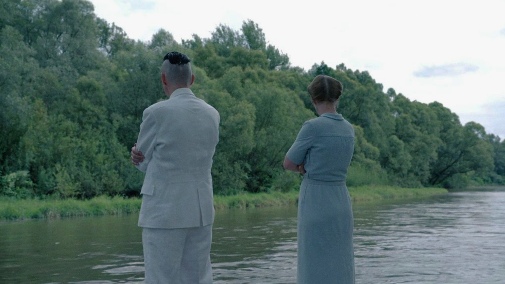
BEN: Hey Nick! I will freely admit that The Zone of Interest haunted me in a way that I won't soon forget. I consider it among the absolute best of the year and one of the most impactful Holocaust films to come out in some time. The praise for the film is near universal, so I know that you thought it was just as exceptional as I did. We can be in agreement, and then call it a day. Quick and painless...you thoughts?
NICK: I am definitely haunted by it! There’s plenty to admire in Jonathan Glazer’s direction, and I can’t deny I was taken aback by its provocations when I watched it. But even without the comparison to Glazer’s previous stone-cold masterpieces, I felt myself disengaging from the movie’s rhythms as it went on. Intellectually, I get why we’re kept at such a remove from the Höss family, and what the oppressive sound design and spycam cinematography are meant to convey about these people. I swear I do. But this did not connect with me the way it clearly has with you, and I would love to hear more about why this is one of the best movies of the year for you . . . .
BEN: The term "banality of evil" is used too much when talking about this film, but it's overused for a reason. It's the perfect phrase. I always find it difficult to describe this film to people because nothing monumental happens. If you take out the Auschwitz/Nazi part, this would be a domestic drama about how a family wants to keep roots despite the husband's job butting up against it. That's the magic. It does not humanize Nazis, but it makes Nazis into humans, if that makes any sense. It in no way minimizes or excuses their horrible actions, but it shows how painfully normal their actions have become. Everyone around them is in a constant state of heightened tension, but they go along like everything is normal. It forces the viewer to relate to someone they ABSOLUTELY don't want to relate to, which is a feat in and of itself.
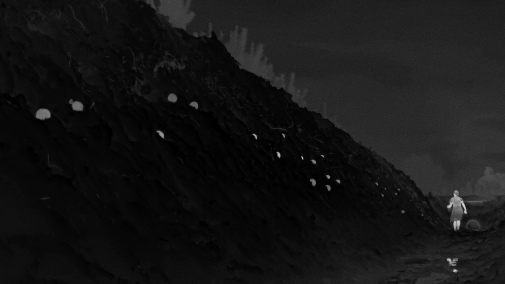
On top of that, when the Polish girl is shown hiding food for the prisoners, she is never shown with any sort of detail or characteristics. Glazer never allows the audience to have a viable rooting interest. There are no good guys, and even when there is a good guy, they have no face. Forcing an audience to come face-to-face with an evil without actually personifying what evil they are doing is a bold statement for a filmmaker to make.
Do you feel your history with Glazer's other films is the big blocking point for you?
NICK: I reject “the banality of evil” as an apt summary of what The Zone of Interest is doing. It's depicting banal events, but that term is all about denying responsibility for committing genocide and passing the buck about who was really making those decisions, not "juxtaposing everyday motions with horrible evils." Furthermore, I think that idea of juxtaposition, which I take to have some sort of compartmentalization built in on the part of the people it describes, doesn’t work for the guy running Auschwitz. He is so. happy to be improving the efficiency of their gas chambers and killing even more Jews.
His wife is so happy about the Eden she's built to honor the Führer's ideals. We see the heightened tension in the servant's gaits, in the different routines the children have to get through the nights, and in how Hedwig's mother regards their home. But nothing in that justifies either reading of "banality of evil" for me. Maybe that's too much parsing semiotics, but this film is trying to be art installation provocateur, so let’s embrace it.

I don't think my history with Glazer's other films is precluding me from loving this one, especially when they're already so aesthetically and thematically different from each other. I also don't think Glazer is super interested in making the Höss family human-passing. The rigid formalism of his approach, the spycam cinematography and refusal to give anyone in the film a close-up keeps them at a much more conspicuous distance. They read as archetypes, not individuals, and I think the coldness of Glazer's direction keeps us from a deeper level of psychological identification. What strikes me most about The Zone of Interest is how it present the structures of their lives, the parties and board meetings and simple number-crunching that keeps them afloat. To steal a line from our own Cláudio Alves, maybe the pitch should be that banality itself is evil?
BEN: It's a fascinating argument. More than anything, I can appreciate Glazer's general approach to unsettling his audience. The film wants to keep the audience on edge while not pushing the issue into direct provocation. If you look at a filmmaker like Andrew Dominik, he wants to unsettle the audience, but uses lurid images or outward grotesqueness to do so. Glazer has much more respect for audience sensibilities. He isn't afraid to push the envelope of audience expectations. Think of Ben Kingsley's language in Sexy Beast, the bathtub scene in Birth, or the general idea of black goo in Under the Skin. Here, I feel Glazer wants to show you a boring family unit, but also wants a distance so that family unit can't actually be connected to. I really expected more people to misinterpret what the film is doing, and I certainly don't think you are misinterpreting it either.
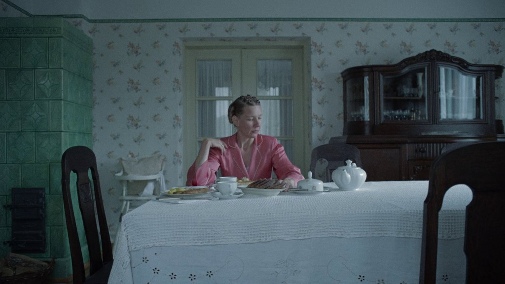
I can tell just from our conversation you didn't truly hate the film, but rather you don't see it as the masterpiece than many others are claiming. Would that be accurate?
NICK: That would be accurate! I think there’s a lot formally going into it that makes it unique among Holocaust dramas. The refusal to psychologize the Höss family even as it makes room for human-sized projection and speculation is a tricky feat. A better comparison for me might be something like Son of Saul, which stitches itself to a more obviously sympathetic main character and a more legible plot but still builds in a hell of an audiovisual stratagem to make its audience really look and listen for the horrors of Auschwitz.
I’ll say this, as far as a straightforward compliment goes for The Zone of Interest, I’m really into what Sandra Hüller is doing as Hedwig. There’s so much in her waddle and her hideous, historically accurate hair to specify a character. She looks and moves like a giant toddler. Her girlish tone when reminiscing about romantic getaways, her ringleader attitude with the other officer’s wives, and her nasty, abusive petulance whenever something doesn’t go her way is really stunning. She goes the farthest of anyone onscreen to change the temperature of the film without violating Glazer’s austerity, and by opening some different emotional channels, she allows the audience new reactions to these people. Rewatching the film has also given me new appreciation for Johnnie Burns’ sound design and for Chris Oddy’s sets. Is there a particular aspect of the film that you really appreciate?
BEN: I obviously ride for the most sympathetic character, the Höss family dog. She doesn't know hatred, she just wants a treat. Snoop from Anatomy of a Fall really stole her thunder.
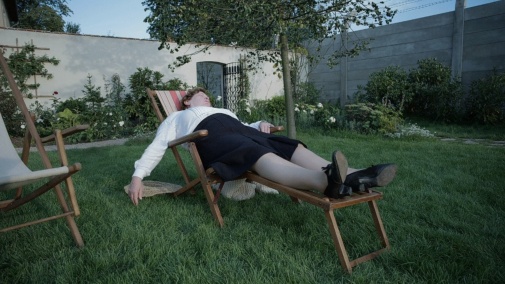
Seriously though, I really like what Imogen Kogge is doing as Hedwig's mother. She doesn't stick around for long, but it still gets the point of how truly far gone this family has gone to assume this is a normal and idyllic life. She does quite a bit with very little dialogue. I also greatly respect what Hüller is doing. Craft-wise, I also love Burn's sound work and think Mica Levi's haunting score matches the film's tone well, though it's definitely not the kind that gets awards attention.
Nick, I'm glad at the very least we can be civil about our disagreements on the film. Wonderful to talk with you as always. Any last words?
NICK: Ohhh, Imogen Kogge’s a good call! And you’re very right about the dog, who’s also Sandra Hüller’s real-life pup! Wish I had connections like that.
Thank you for discussing The Zone of Interest with me! Talking out my qualms with this film has given me a better sense of what I think it’s doing, and what I wanted from this versus what it’s actually interested in giving me. This conversation has been really nice, and talking to you is always great.
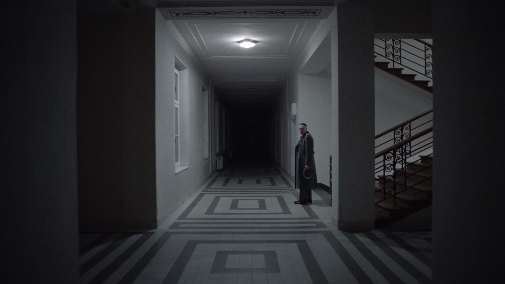
Previous Split Decisions:



Reader Comments (1)
I consider this a masterpiece, and I wonder what the experience of it us like for people who get around to it simply to say they watched all the best picture nominees. There must be a lot of bored, baffled walkout.
Genuinely surprised how well this did nomination-morning, when it really is, as you've described here, a sort of "art installation", both chilly and chilling in ways that would normally prevent mass adulation.